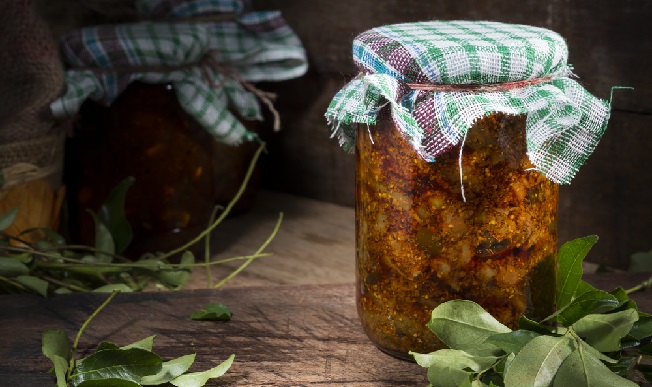Pickles are a beloved condiment across India, adding a burst of flavor and spice to countless dishes. But within this world of pickles, there exist multiple pickle types and pickling techniques – fermented pickles versus vinegar pickles. Both methods have their own unique characteristics, impacting taste, nutrition, and tradition.
Fermented Pickles
Fermented pickles, popular in regions across India, are the product of an age-old process. Here, vegetables like mangoes, lemons, and chilies are submerged in a different varieties of oil along with spices like mustard seeds, fenugreek, and turmeric. This creates an anaerobic environment, allowing good bacteria (lactobacillus) to thrive. These bacteria munch on the vegetables’ natural sugars, producing lactic acid as a byproduct. This lactic acid is what gives fermented pickles their distinctive tang and acts as a natural preservative.
Vinegar Pickles
Vinegar pickles, on the other hand, take a more streamlined approach. Vegetables are directly brined in vinegar, typically white or apple cider vinegar. This method delivers a quicker pickling process and a sharper, more acidic flavor compared to the fermented kind. Spices can also be added to vinegar pickles, but the focus is primarily on the vinegar’s punch. Some common examples of vinegar pickles in india include chilli pickles or pickled onions.
Flavor Comparision
Fermented pickles boast a complex, rounded sourness that develops over time. The natural sugars from the vegetables are broken down, resulting in a more nuanced flavor profile compared to the upfront tang and spiciness of vinegar pickles.
Nutritional Breakdown
Fermentation brings a surprising health benefit to the table. The good bacteria, or probiotics, produced during the process contribute to gut health. While vinegar pickles retain some nutrients from the vegetables, fermented ones might offer a slight edge in this department.
Shelf Life Comparision
Both styles of pickles are known for their extended shelf life. Fermented pickles, thanks to the lactic acid, can last for months at room temperature, while vinegar pickles might require refrigeration after opening.
Tradition Takes Center Stage
Fermented pickles are deeply ingrained in Indian culinary heritage. Recipes passed down through generations use natural methods, making them a link to the past. Vinegar pickling, on the other hand, offers a faster and more predictable method, making it a convenient choice for modern kitchens.
Ultimately, the choice between fermented and vinegar pickles boils down to personal preference. If one craves a complex, tangy flavor with a touch of health benefits they should go for fermented. If one desire a quicker pickling process and a sharper punch of vinegar then Vinegar pickles are the choice. However. if one chooses to seek a traditional, nostalgic pickle which goes with all meals and reminds them of the taste prepared by their grandmothers then fermented pickles reign supreme.
Achaar Galis’ Fermented Home Pickles
For those who wish to seek the traditional homely fermented flavour, Achaar Gali provides multiple varieties. Pickles like Aam ka Achar, Nimbu ka Achar, Mirch ka Achar, Kathal ka Achar enhance your meals multifolds. You can easily buy them online at our ecommerce store and enjoy the taste of home at your convinience!

